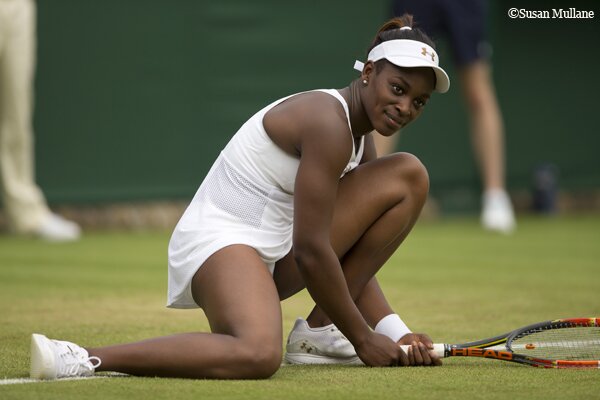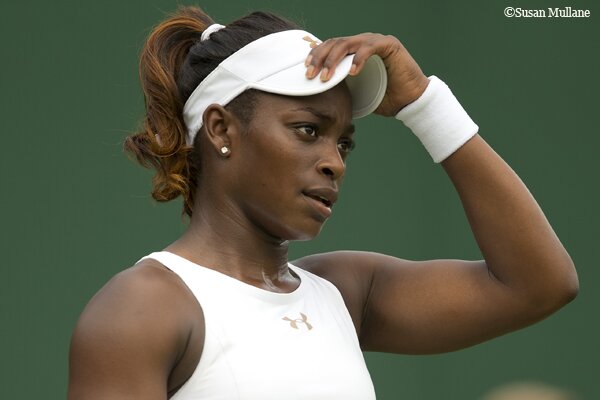By Sandra Harwitt
T’is the sad story of Sloane Stephens, the lass who is starting to get shown up by her American peers.
At just 21, Stephens has been of notice for a number of years already. That she has. And for good reason. She’s been very notable at the Grand Slams where she reached at least the fourth round at the six previous Grand Slam tournaments.
Now that’s carrying an impressive record, especially for someone so young and with few achievements to date. For in reality that has been what is most special about Stephens, especially that 2013 Australian Open semifinal showing.
But, alas, all good things to come to an end and on Monday at Wimbledon the Stephens streak was put to a dead stop. Stephens kept a stiff upper lip and didn’t appear heartbroken to be a first-round loser at Wimbledon, falling to Maria Kirilenko of Russia 6-2, 7-6 (6). At least to the media, Stephens was downright cheery and doing a good job of seeming unworried.
“The streak is broken,” said Stephens, smiling. “I’m so sorry to all of you (the media) who don’t have to write about me this week and next week. I’m so sorry….” It (the streak) was a great accomplishment, a great thing. Hopefully, it will be the last time I lose the first round of a slam but, hopefully, I don’t have to live through that again. Maybe in the next slam I’ll make the second week again.”
According to Stephens — and almost every other player — they never look at the draw. As in NEVER! Someone just tells them who they’re playing, and who they’ll play next presuming they win their match. Personally, I’ve never believed this pronouncement as I think it defies human nature. Who could help but look when it’s out there everywhere — people want to know what they’re in store for down the line.
So Stephens supposedly had no idea of what the possibilities were beyond playing Russian Maria Kirilenko in the first round. And as it turned out she didn’t need to know she was located in the bottom half of the draw, and second seed Li Na could’ve been the potential fourth round opponent if she continued her Grand Slam streak.
Nope, that’s knowledge no longer of importance thanks to Ms. Kirilenko, who was a Wimbledon  quarterfinalist in 2012. Kirilenko trounced on Stephens in the first set as the American only held serve in the second and fourth games. In the second set, Stephens took a 3-1 and 4-2 lead, but couldn’t hold even the score to one set apiece. Serving at 5-6, Stephens did manage to hold serve by fighting back five match points for Kirilenko. But it was all over for Stephens on a second match point in the second set tiebreaker — she was heading for the exit.
quarterfinalist in 2012. Kirilenko trounced on Stephens in the first set as the American only held serve in the second and fourth games. In the second set, Stephens took a 3-1 and 4-2 lead, but couldn’t hold even the score to one set apiece. Serving at 5-6, Stephens did manage to hold serve by fighting back five match points for Kirilenko. But it was all over for Stephens on a second match point in the second set tiebreaker — she was heading for the exit.
“Obviously, Maria is a great player,” Stephens said. “She’s done well here in the past. I knew it was going to be tricky, but that’s like every other Grand Slam first-round math. She definitely played well today and it was tough. But sometimes it’s just too good, and today was one of those days.”
Currently ranked No. 18 in the world — Stephens has been as high as No.. 11 in October of last year — it’s hard to deny the rankings have been a cushion that’s enabled Stephens to feel more secure than she should. That ranking is based on her performances at the Grand Slams, which cannot be denied as worthy, but not an accurate explanation for where Stephens truly is located in the game. A player must be judged by their overall showing in a year, not just on less than a handful of tournaments, even if that handful represents the best of the best.
If there was one question posed to Stephens on Monday that did put forth a glimpse of how she really feels it was when she was asked about American contemporary Madison Keys, 19, winning her first career title at Eastbourne on Saturday. Stephens, herself, mentioned that CoCo Vandeweghe, 22, also scored her first title on Saturday at the ’s-Hertogenbosch tournament.
Here’s how Stephens addressed the topic: “Awesome, really great, Really happy for her. And CoCo, too. That’s really awesome.” But then she added this telling remark: “Just add those two players to the list of players who have won a tournament before me. But that’s okay. Don’t worry. I’m glad they won.”
Yes, that remark was caged in niceties, but it did reveal that Stephens was confused a bit about how she’s had the better results on the bigger stage, but the others ended up scoring the real prizes first. For getting to the second week of a major is fine and dandy, but you can’t put that into your souvenir cabinet like you can a shiny winner’s trophy.
It’s my theory that Stephens’ Grand Slam results have actually hurt her and caused a setback for the talented player. As they might say here in England – she jumped the queue (that’s line for those in the USA who might not understand British speak). Her fairly instantaneous success at the majors kept Stephens from focusing where she should — on the step-by-step program. She became intoxicated at the attention at the Slams and seemed way less engaged at the regular week events. This was not a fate that befell Keys and Vandeweghe, which might have worked in their favor.
Out of fairness to Stephens I should point out that she discounts my belief as not the case: “It was never I’m just going to focus [on] doing well at the Grand Slams,” she said. “It never happened that way. That’s why I never had a real reason for why I had so much success at a Grand Slam. It just happened that way. Maybe in the next tournametn that I play, I’ll win it. Then I’ll be like, ‘Remember when we were talking at Wimbledon.’ So we’ll see.”
For Stephens, I hope she’s right in terms of her capturing the next tournament — or one of the next tournaments — she plays. And that’s because players, not even the greats, just win the majors. Winning the more mundane events are essential to all careers. And for some players those weekly events are the only prizes they’ll ever receive and they’ll feel mghty lucky. For as we all know, for every player who wins a title there’s a lot more who won’t ever take the trophy home.



 23 Jun 2014
23 Jun 2014  Posted by Sandy
Posted by Sandy
